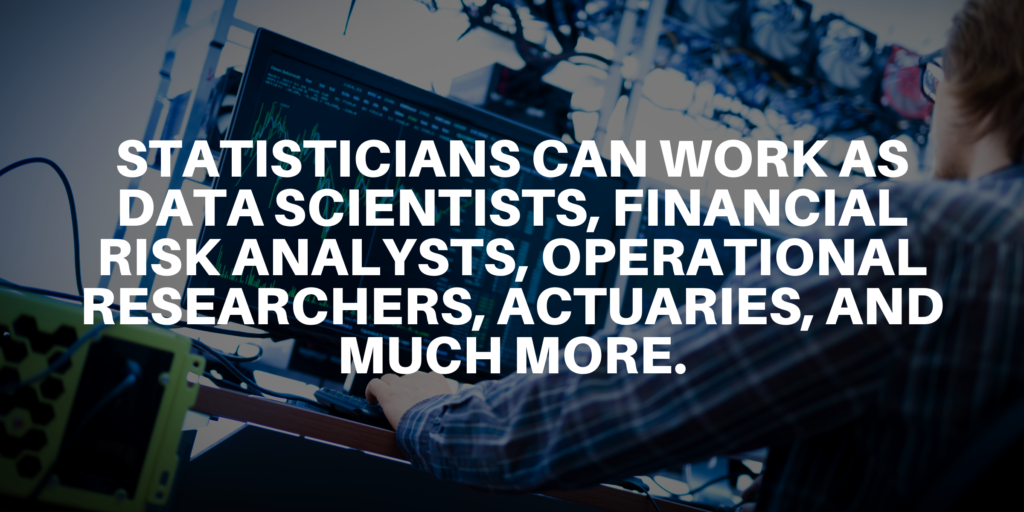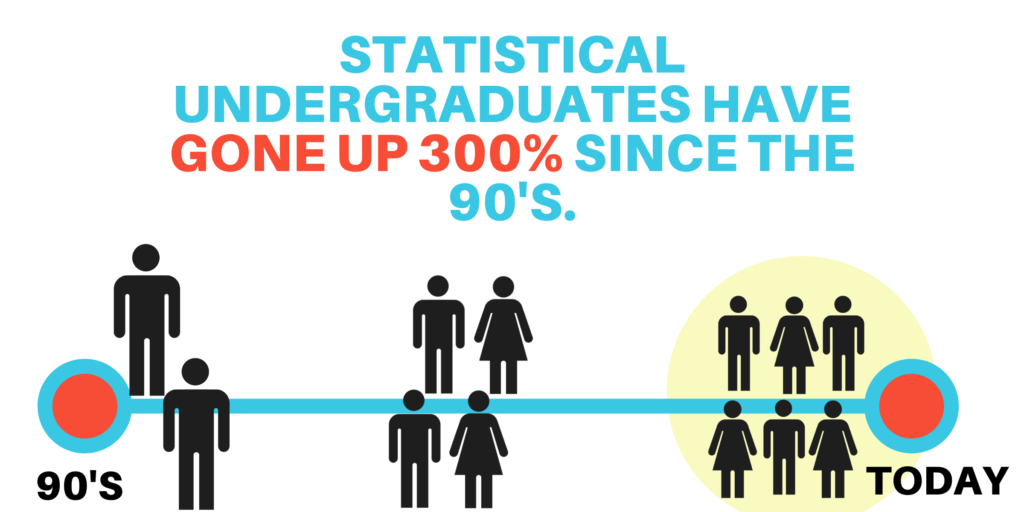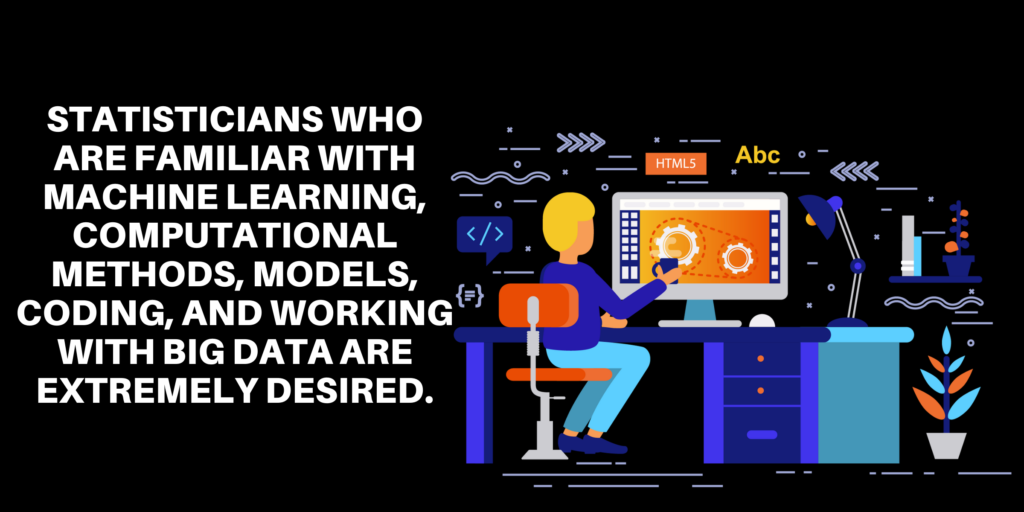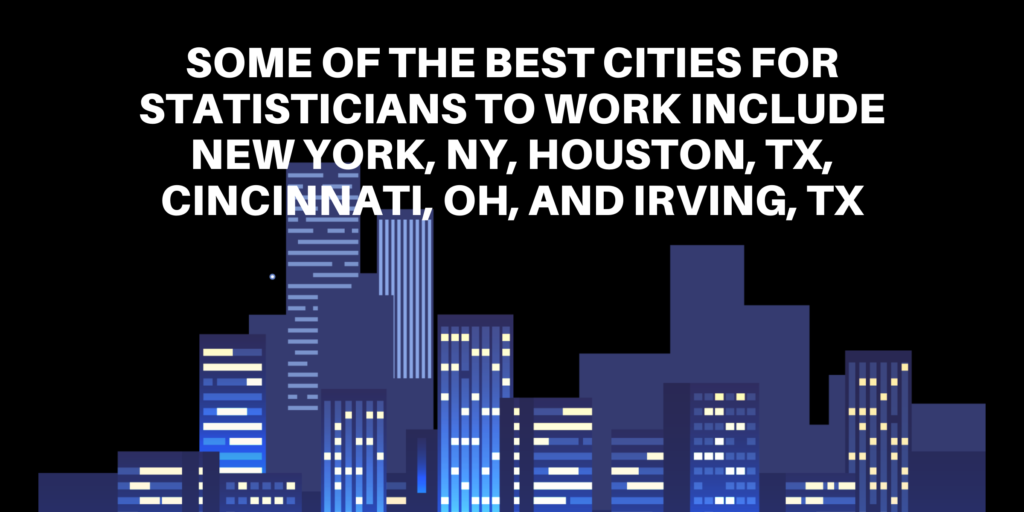![]()
“Statistics is the grammar of science.” – Karl Pearson
If you feel powerless and overwhelmed by the atomized, disconnected nature of society, you’re not alone. However, there’s something you can do about it: gain skills that help you understand and impact specific aspects of our society.
Statistics are one of the significant ways humans make sense of the world around them. For many, they represent a way to quantify problems and find solutions that can meaningfully change individuals, organizations, and society at large.

Studying statistics, and working with them involves everything from gathering data, organizing it, interpreting it, analyzing what you’ve found, and presenting your findings. You might collect information about people living in a city or the pipes that deliver water to them. Anything that involves a population, repetition, and gathered data can be measured statistically.
Two main statistical methods make up data analysis. If you choose to study this discipline, you’ll become well-versed in both. There are descriptive statistics, which communicate composites like standard deviation, averages, and more. And there are inferential statistics, which interpret data that are dependent on random variation, like the samples you chose, or errors in observation.
Today, organizations and sectors across the economy are turning to statisticians and data analysts to increase their efficiency and deliver better results internally and externally.
Take professional sports, for example. This multi-billion dollar industry was once ruled by the intuition of seasoned players, coaches, scouts, and executives. In the past few decades, decisions are increasingly being made by models that find players and methods that are undervalued. The people finding this unexploited value are often mathematicians and statisticians who don’t have a traditional sports background.
Tech is another area where statistics reign supreme. We live in a world where more information is collected about individuals than in any other era of human history. But what do you do with all that data? How do you organize it, and monetize it? How do you make decisions that will advance organizational goals based on what you’ve found? All this and more is being answered by statisticians and data analysts.
Statisticians help shape government policy, develop and measure the efficacy of new drugs before they hit the market, and oversee investments for large financial institutions. They monitor the effects of climate change, predict and refine marketing strategies, and figure out the probabilities of life on other planets. Virtually any organization that wants to measure their performance and improve it either employs statisticians now or will in the future.
This field is experiencing rapid growth and is predicted to hire far more people in the coming decade. By earning a degree in statistics, you can ensure a stable, lucrative career for years to come.

In this guide, we’ll explore the available degrees in statistics, specializations in the field, and more. We’ll look at what we’ve written to help you find a statistics degree, or understand what your role in the field could be. We’ll also explore how much you can earn in various occupations related to statistics and predicted job growth for these roles. Throughout we’ll try to help you decide whether statistics is right for you.
Before we begin, ask yourself and consider the following:
- What degree level have you completed so far? How have you prepared for a degree in statistics professionally and educationally?
- Do you have a natural aptitude in math and science? Do you have a passion for understanding the world around you, and solving problems?
- What would you like to do in statistics? Would you like to work in data analysis, modeling, write algorithms, or all of the above? Do you want to work in a specific area of the economy?
- Different statistics programs can prepare you to do different tasks and work in different areas. Explore the curriculum of any program you’re interested in to see if it aligns with your goals.
- How much can you afford to spend on your degree?
- The total price of your degree depends on the school that offers it, their pricing, the delivery format you select, how long it takes to finish it, the aid and scholarships you qualify for, among other factors.
- If you need to borrow money to afford your degree, take out public loans instead of private ones. Only peruse schools that are accredited, affordable, and non-profit instead of for-profit schools with bad reputations.
- How much time can you commit to a statistics degree daily, weekly, and in total before graduating?

- Would you attend a statistics degree part-time, full-time, online, or in a hybrid of online and on-campus attendance? You can save money and perhaps time with an online program, or with a public university or junior/community college.
- Where do you want to live and work during and after you earn your degree? Fortunately, statisticians that receive an up-to-date education are in demand across the country. You still might want to attend a school that’s located where you want to live after graduating, so you can network locally while you complete your degree.
- How will an individual statistics program train you to do what you want to in your career? How can it build on your strengths and soften your weaknesses?
- What specializations in statistics are offered at a specific program? How can they help you reach and surpass your career goals
If you find any schools that appeal to you, do yourself a favor and reach out to their support staff directly. You can ask questions about the program, get help in your application, find out what aid you might qualify for, and much more.
Now let’s explore what you’ll get out of a degree in statistics:
Statistics Degrees Require and Develop Your:
- Thoughtfulness: Statistics is much more than math. It requires consistently making logical judgments, then overcoming your failures. You’ll need to consider and identify factors that create outcomes. You’ll sift through data and information while deciding how much to weigh what you’ve gathered. Throughout, you’ll need to work off of empirical evidence, not intuition. You’ll have to confront your own biases and others, including the people you work with and the subjects of your information gathering.
- Thoroughness: As you progress through your degree, you’ll learn invaluable lessons through failure, and your findings contradicting your expectations. You’ll learn to refine each step: from how you gather information, to how you weigh it, to the conclusions you draw from it. Often experiments, studies, coding, and algorithms need a lot of tweaking to bear fruit. These programs will teach you how to work until you succeed.
- Math and Computer Science Skills: You’ll have to use a range of hard skills, like programming, calculus, linear algebra, and much more, to create models and analyze them. You’ll build up these skills in these programs, but will need a good deal of natural aptitude in these areas.

- Recalibration After Failure: You can fail in many ways, but you’ll need more than resilience to recover. You’ll have to figure out why your models or conclusions were wrong, and create new avenues to collect more useful information. Statistics can be shaped and produce results that shade things in ways that aren’t useful to you or anyone. When that happens, you’ll need to figure out where you went wrong and shift your weight or occasionally scrap models and datasets outright. Figuring out your mistakes and correcting them requires having a small ego, a strong memory, and a willingness to change minds and methods.
- Critical Thinking Skills: You’ll have to use reasoning to make decisions that you’ll then test repeatedly. However, you won’t be able to rely on the information you’ve gathered before you’ve gathered it, so your intuition will play a role. That intuition needs to rely on common sense and logical thinking, which you’ll build throughout these programs and your career.
These are just a few of the aspects of yourself you can expect to exercise and improve upon in statistics degrees.
Now let’s look at what we’ve written that can help you get into these programs and decide if they’re right for you:
How Can We Help You Find the Best Statistics Degree for You?
Here at Degree Query, we’ve done our best to provide you with the information you need to choose a degree that can radically improve your life. We’ve answered common questions, ranked degrees and jobs, and written guides like these. We’ve also created a compare careers matrix to help you choose the right educational path based on many criteria. If statistics aren’t a good fit, you can peruse what we’ve written about several other degree disciplines on our homepage. Here’s some of what we’ve written about statistics, mathematics, and related degrees:

Common Questions and Guides
- What Can I Do With a Criminology Degree?
- What is a Bachelor’s Degree in Bioinformatics?
- What is a Master’s Degree in Bioinformatics?
- What is a Bachelor’s Degree in Biostatistics?
- What is a Master’s Degree in Biostatistics?
- Statistics Jobs: What Kind of Job Can You Get With a Degree in Statistics?
- What Are the Highest Paying Jobs With a Degree in Statistics?
- What Is the Difference Between a Mathematics Degree and a Statistics Degree?
- What Is the Benefit of a Mathematics Degree Vs a Statistics Degree?
- How Do I Prepare for a Statistics Degree While in High School?
- Do I Need a Graduate Degree to Get Involved in Health Informatics? Which Ones are Best?
- What Are the Best Undergraduate Degrees to Prepare for a Career in Health Informatics?
- What Can I Do With a Political Science Degree?
- What Can I Do With a Biomedical Engineering Degree?
- What Degree Do I Need to Be a Genetic Engineer?
Rankings
- Top 50 Highest Paying Master’s Degrees
- Top 10 Highest Paying Jobs in Computer Science
- Top 50 Degrees for the Future
- Top 50 Online Business Degrees
- 50 Highest Paying Bachelor’s Degrees
- Top 25 Fastest Online Doctorate Degrees
- Top 10 Paying Jobs That Involve Math
If you find any degrees through our content that you want to apply to, you can help yourself by reaching out to the support staff at the schools that offer them. You can ask them questions about requirements, get help on your application, find out what financial aid you might qualify for, and more.
Let’s look at the different levels of degrees in statistics:

What are the Different Levels of Statistics Degrees?
Associates in Statistics
These degrees take two years to earn. You might find an associate’s in statistics, but you could also opt for one in mathematics or data science. You’ll take foundational statistics courses, and perhaps explore areas like trigonometry, geometry, calculus, programming, and algebra. These programs are often offered by a community or junior college. These programs usually provide online courses and are cheaper than traditional four-year colleges and universities that have on-campus instruction. Associate programs also often have transfer agreements with colleges and universities to make sure your credits transfer towards completing your undergraduate education.
Bachelors in Statistics
Here you’ll need four years to complete a degree unless you have applicable credits. You’ll learn how to gather, organize, decipher, and analyze information. You’ll be able to make use of that information in many ways, and different settings for diverse organizations. You’ll take courses like linear algebra, applied statistics, applied regression analysis experiments and sampling, and applied regression analysis. You might also take calculus, biostatistics, and other classes in niche areas of math and statistics. Graduates will be ready to enter the careers as mathematicians, statisticians, and perhaps data analysis, depending on what courses they’ve taken. They can also further their education at the graduate level.
Masters in Statistics
These degrees take two to three years to complete. You’ll go further into methods for collecting information, like how to choose a sample size, create questionnaires, and much more. You might also specialize in business, actuarial statistics, biostatistics, data science, or computational statistics. Sample courses include statistics theory, applied quality assurance, statistical programming, variance model analysis, advanced probability, among others. Graduates will be prepared for elite positions across many industries, like business, government, education, sports, healthcare, and much more. They can also go on to earn a doctoral degree.
Doctorates in Statistics
These degrees take three to five years to complete, depending on whether you pursue them part or full-time. You can opt to study applied or theoretical statistics. You’ll also likely pursue a specialization area. These degrees feature advanced courses like statistical computing, genetic data analysis, nonparametric statistics, statistical quality control, and more. You’ll also likely do original research that leads to a doctoral thesis and its defense. Graduates can work in academia, research, or elite positions across multiple organizations. Statisticians, data analysts, and related jobs are expected to grow drastically over the next ten years. If you have a doctoral degree in these areas, you’ll be extremely demanded.
Now let’s look at some of the specializations, focus areas and related degrees in the statistics family:

What are the Different Specializations in Statistics and Related Degrees?
Financial and Risk Statistics
In these specializations, you’ll study how financial markets impact society. You’ll work with finance specialists, policy-makers, economists, governmental and non-governmental organizations, and much more. You’ll work to understand our complex markets and the financial plans of specific organizations to prevent crises and risks for shareholders.
Data Analytics
An applied statistics degree focuses on foundational statistical theory, model building, and traditional methodology. On the other hand, a data science degree looks at data manipulation, machine learning, and the latest in data analysis. Data analytics is more modern and alongside statistics a rapidly growing part of the economy.
Bioinformatics and Biostatistics
Here you’ll use statistics to supplement research in genetics, biology, genetics, environmental science, human health, and more. You might play an essential role in measuring new treatments, analyze biochemical data, and much more. You might work in gene mapping, developing statistical tools that analyze genomic data and other biological information. There’s a scarcity of people with experience using computational methods and biology that you can help mitigate in these degrees.
Environmental Statistics
This is great for anyone who wants to use statistics to create a more sustainable, healthier world. Here you’ll use math, research, outreach, and analysis to advocate for communities, warn against environmental risks, chart damages to different ecosystems, and much more. You might work on air quality, public works like water systems, toxicology, and much more. (Learn more about the 5 best careers in environmental science.)
MBA/Statistics
You can combine a degree in statistics with a business education in these specializations. If you want to be a business leader who understands and operates the scientific and hard math that governs business and finance, this is a great option.
These are just some of the specializations you can opt for in the world of statistics. Now let’s take a peek at what you can expect to earn and your job opportunities after securing one of these degrees:

Statistics Degrees in Conclusion
On behalf of the entire Degree Query team, we hope you’ve found this guide extremely helpful, informative, and compelling. More than anything, we hope you’ve come closer to deciding whether a degree in statistics is right for you.
Statistics help us make sense of a chaotic, often incomprehensible world. They can be used in many different ways, and to make cases for just about anything. Remember, stats are only as useful as the factors they include, the parameters that define them, and the statisticians that create and decipher them.
If statistics are for you, get started applying for a degree. Use the questions and considerations we’ve given you (and your own) to organize your search and whittle down your options. Remember to contact the support staff at any school you’re interested in. You can get answers about the application process, requirements, curriculum, financial aid, delivery formats, and much more.
If a statistics degree isn’t for you, make use of our resources on all the other available degree disciplines to find one that’s a better fit for you.
So what can you expect to earn after getting a degree in statistics? What are your job prospects? Let’s take a look:
- All of the information here was culled from the United States Bureau of Labor Statistics.
- Computer Systems Analysts: In 2018 the annual median pay for these roles was $88,740.
- There were 633,900 of these roles in 2018. This was expected to go up by 9% between 2018-28, leading to 56,000 new jobs. The typical entry-level education was a Bachelor’s degree.
- Financial Analysts: In 2018 the median income for these roles was $85,660 a year.
- There were 329,500 of these positions in 2018. This was predicted to rise by 6%, leading to 20,300 new roles.
- Operations Research Analysts: The 2018 median annual income for these jobs was $83,390.
- There were 109,700 of these positions in 2018, which was expected to go up by 26% between 2018-28, leading to 28,100 new jobs. That growth is much faster than average for all occupations.
- Mathematicians and Statisticians: The 2018 median pay for these jobs was $88,190 annually.
- There were 47,300 of these roles in 2018, which was predicted to rise by 30% between 2018-28, creating 14,400 new jobs. This is also much faster growth than average.
Remember to contact the support staff at any school with a program you find that you’re interested in. You can get invaluable assistance, practice networking and perhaps make an ally in your hunt for a degree.
Statistics can give you a reliable, highly demanded career doing work that most people can’t. Best of luck finding the best degree for your needs, and in your career after graduating!
